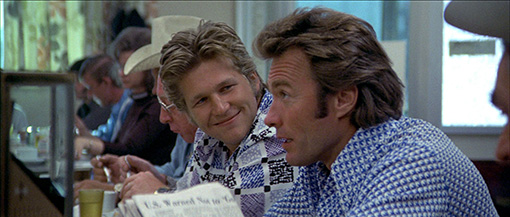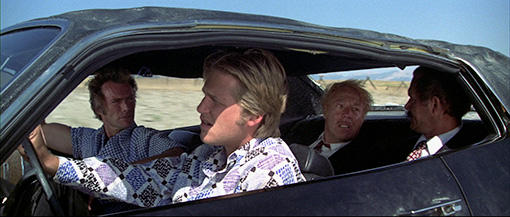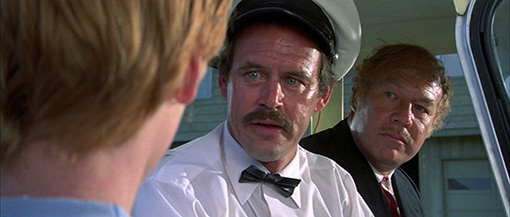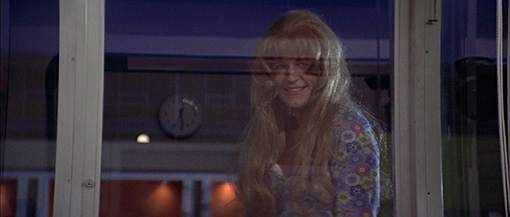"Say something funny now, smart-arse." |
Red Leary |
The opening sequence of Thunderbolt and Lightfoot, the 1974 debut feature from The Deer Hunter and Heaven's Gate director Michael Cimino, is a captivating blend of 70s restraint and neat character intrigue, but does boast one element that takes some swallowing. But maybe that's the point. In a pair of lovingly composed and unhurried wide shots, a small white church is picked out of the rural landscape and the soundtrack is coloured by the distant chorus of reverential hymn singing. A car appears in the distance and drives past the church, then doubles back and parks outside of it. A man emerges, sweating with the heat, and takes a curious look at the ramshackle sign outside that announces the service is being conducted by the Reverend John Doherty. It's when we get to meet Doherty that the game is up. He's played by Clint Eastwood, and even back in 1974 there was no way anyone was going to buy Eastwood as a preacher. The hopelessness of the deception is emphasised by his delivery of the sermon, which he rasps out in the manner of a serious threat that you can't help thinking should conclude with the word "asshole". Does it matter? Not a hoot. If anything, this economically tips us off to the fact that Doherty is an imposter in hiding, which is confirmed when the stranger walks in to the chapel and starts shooting at him, prompting the good Reverend to scurry through the back door and run for his life.
Intercut with this is a separate story of nefarious deception, as a young drifter approaches a used car lot, feigns a chronic limp and spins the salesman a story about a wooden leg, then speeds off in a custom car he has been encouraged to get a feel for. A short while later the two stories literally collide when the fleeing Reverend attempts to flag down the drifter's car, forcing it off the road and headlong into the angry stranger. The drifter drives away with the Rev hanging half in and out of the passenger seat window. The drifter's name is Lightfoot. The Rev, we later discover, is a notorious former bank robber who earned the nickname Thunderbolt after blowing open a vault with a 20mm canon and armour-piercing shells. Lightfoot is delighted by this revelation. "Thunderbolt and Lightfoot," he remarks, painting the marquee display with a spread of his hands, "That sounds like something, doesn't it?"

Thunderbolt and Lightfoot is a rare example from the 1970s of Clint Eastwood effectively sharing the lead role, as despite his headline credit and poster dominance, this is as much a Jeff Bridges film as it is a Clint Eastwood one, and the general consensus is that Bridges outshines Eastwood here and was even nominated for an Oscar for his efforts. The two certainly make for fascinating pairing, with Bridges' playful energy both counterpointing and complimenting Eastwood's hard man stoicism, a tried and trusted screen persona that is given a slightly more fragile edge here by the early entrance into the story of the sadistic Red Leary, played with dangerous menace by George Kennedy. Part of the same crew that pulled off the robbery that gifted Thunderbolt his moniker, Leary is a sawn-off shotgun of pent-up anger, a weapon with a hair trigger and zero tolerance for just about everyone except his more laid-back partner Eddie Goody (Eastwood regular Geoffrey Lewis). Convinced that Thunderbolt ripped him and his colleagues off and kept the spoils of the robbery for himself, Leary has made it his mission to hunt down and kill his former compadre. But when he finally confronts Thunderbolt face to face, he discovers that the money was hidden behind the blackboard of a one-room schoolhouse that has since been replaced with a larger, brick-built establishment. Leary and Thunderbolt thus agree to put their past grievances on hold, and on Lightfoot's suggestion the four men team up to stage a rerun of the original robbery.
For its first forty-five minutes, Thunderbolt and Lightfoot is the sort of buddy road movie that flourished in the 1970s, its mismatch of opposites typical of this sub-genre; Thunderbolt is a stoic professional who is guarded with his words and sizes a situation up before taking action, while Lightfoot is a cheerful anarchist who acts impulsively and rarely considers the consequences of opening his mouth. When they first meet, it seems likely that Thunderbolt only tolerates Lightfoot at all because he needs him to effect his escape from the danger zone, and once he's reset his dislocated shoulder (ouch!) and the pair have swapped cars, it's no real surprise when he bids Lightfoot farewell. By then the balance of need has subtly shifted – Lightfoot has come to enjoy the older man's company and is aware that there is much he could learn from him. But Thunderbolt is not looking for an apprentice or a companion – it's only after catching a fortuitous glimpse of Leary (in one of those coincidental moments that belong only in movies) that he rejoins the younger man and the friendship that will later prove so crucial really starts to evolve.

The speed with which this happens may on the surface seem unlikely, but it does offer a window into the probable loneliness of a man who has spent some time in anonymous isolation. The age gap between them may also make it easy to read their relationship as a surrogate father/son one, but it's pleasingly never played this way. Despite Lightfoot's faults and easy immaturity, Thunderbolt seems to accept him on equal terms – he expects him to prove himself, just as he would any partner in crime, but he clearly believes he is up to the job, a faith unsurprisingly not shared by the ill-tempered Leary. There's even been a persuasive case made for this as an asexual male love story, and it's the strength of this bond that provides the continuity when the film smoothly switches genre from buddy road movie to lively crime caper thriller, as the uneasily aligned quartet begin making plans to restage the earlier robbery. This requires each of them to play their part and lands Lightfoot, as the youngest and prettiest, with the most uncomfortable (and least macho) task. It's an ingenious plan, one whose potential for storming success is nicely undercut by that sorely missed 70s uncertainty about just which way the story will go in the later stages.
Cimino's ambition and skill as a first time writer-director (he previously proved himself as the co-writer of Silent Running and Magnum Force) makes it easy to turn a blind eye to the odd character inconsistency and occasional logic blip, such as when Leary, after trying to kill Thunderbolt, then settles for a fist fight that he is clearly destined to lose, or when our two leads are shown happily driving a car that in the previous scene flipped over and lost a wheel. We can assume that one of them was a damned fine mechanic. None of which negatively impacts on a narrative that is both engaging in itself and littered with colourful detail, never taking the direct route to a plot point when a more interesting path can be found. It's an approach exemplified when the four take on low-grade jobs in order to raise the required stake money, leading to a series of economical scenes that may initially seem superfluous to requirement, but which are all memorable in their own way and handled with the same attention to detail as the central narrative, into which they smartly dovetail when the time is right. There's even a comic edge to Goody's job as an ice cream salesman, and a sly bit of social commentary in Leary's anger at the way store cleaners are hurriedly brushed out of sight when the store is due to open.

Cimino also enlivens moments that would normally be handled in purely functional terms by including at least one character created solely to texture that scene: the pissed-off gas station attendant and the harassed customers who are unable to find the right credit card; the mouthy kid who berates Goody for arriving on his street too early with his ice cream van, then refuses to buy anything; the female motorcyclist who keeps a hammer handy to smash the bodywork of any vehicle whose driver tries to harass her; the bugshit insane driver (Bill McKinney, who began his long-term association with Eastwood here) with a trunk full of rabbits that he seems to be carrying purely to let loose at a randomly selected moment and start shooting for sport. There are even a couple of what look suspiciously like improvised exchanges, when Bridges throws Eastwood a line that prompts the sort of amused response that plays more like an actor caught off guard than a professional hard man's amusement at his young companion's wit.
Without doubt one of the strongest films of Eastwood's productive 70s period, Thunderbolt and Lightfoot sits neatly midway between the actor's iconic performance in Don Siegel's Dirty Harry and his self-directed lead in The Outlaw Josey Wales*, a film in which Eastwood absorbed and reworked elements of Cimino's impressive debut to captivating effect (the role played by location and landscape, the use of memorable support characters to richly texture scenes, and the underscoring of drama with character humour). But what really stays with you (spoiler alert...) is the dark turn the story takes in the last act, a development that leads to and most effectively discolours a final twist that would, in other circumstances, have provided a triumphantly upbeat ending. A smartly devised and meticulously constructed work, Thunderbolt and Lightfoot stands as a consistently rewarding and entertaining example of the sort of film that prompts so many of us to look back at this thrillingly vibrant period of American mainstream cinema with such a sense of longing and loss.
A clean, detailed and consistently attractive 2.35:1 HD transfer with a generally spot-on contrast range, crisp black levels and attractively naturalistic colour. The daytime imagery really shines, but Frank Stanley's luminous night-time cinematography is every bit as impressively rendered and sometimes even more colourful. A fine level of natural grain is visible, and is very occasionally more prominent on a couple of the landscape wide shots, but there is no trace of damage or unattractive enhancement and I didn't see a dust spot anywhere. A splendid job.

The Linear PCM 48 stereo soundtrack is clear and spots a decent enough dynamic range for a film of this vintage, although has the expected treble bias and lack of bass punch, even on the robbery canon fire. As with the picture, the track is clean and has no trace of damage.
Not a thing. This can't help but feel like a missed opportunity, as some background information on the film's development and production would have been welcome.
A still terrific, character-driven melding of favourite 70s genres, boosted further by a string of fine performances and a disarmingly moving ending. It's certainly a hell of a feature debut for then relative newcomer Cimino, whose next project would project him (albeit too briefly) to superstar status. It's a film deserving of special edition treatment, but arrives on UK Blu-ray as a disappointingly movie-only version, but for the film and the transfer still has to come recommended.
* That all three were titular roles we can put down to happy coincidence.
|